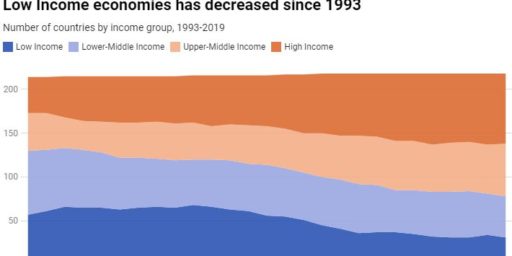Social Security, Privatization and Risk
I admit it, I have shamelessly stolen this from Victor at Dead Parrots Society. But it is a good find and should get more attention than it is getting. The issue is the risk that will come with implementing Model 2 of President Bush’s plan to reform Social Security. Martin Feldstein, a long time advocate of privatization and someone usually thought of as being conservative has the following to say,
The issue of asset price risk is more complex. On the basis of a substantial amount of research, I believe that a suitable mixed system that combines tax-financed pay-as-you-go benefits with investment-based PRA annuities can satisfy three conditions: a substantially lower long-term cost of financing retirement income than the tax projected for the pay-as-you-go system; a higher expected level of benefits from the combination of pay-as-you-go and the PRA annuities; and a very low probability that the actual level of combined benefits will be less than the pay-as-you-go benefits projected in current law. The low risk could be achieved by a combination of three things: the floor on retirement income provided by the pay-as-you-go benefits in the mixed system, restrictions on the investments that can be made in the PRAs, and explicit guarantees provided by either the government or the private market. Because individuals differ in their risk preferences, the solution that can best reflect those different preferences may be the availability of a variety of alternative guarantees from the private organizations that manage the PRAs and PRA annuities.–bold added (link)
See also Victor’s other post on this issue where he looks at how much a person would recieve based on when they retired and what options they took. It still doesn’t get to the issue of risk, but keep watching Dead Parrots Society and hopefully Victor will do some more work on this.






“explicit guarantees provided by either the government or the private market” – am I understanding this phrase to mean the governmetn would cover any excessive losses by a poor investment scheme? How will that possibly do anything except cost more than the current system?
Well most privatization plans have some sort of “gaurantee” built into them. IIRC, Bush’s suggests using as a gaurantee the real value of the principle amount that goes into the personal accounts.
This would only become truly costly if the economy really stinks and personal accounts produce really rotten results. Since this would lead to bad times all around, this would be one of many issues. I.e., you’d probably be worried about much larger problems than this.
Like most conservatives his ‘research’ consists of talking to other like minded conservatives. If he gave a moments notice to real world experience he would see that in the real world when privization has taken place, most notably Chile and England, the cost associated with the program have gone up and benefits have gone down.
If Feldstein if privy to some real research that demonstrates his point he should make it public. Otherwise he is not to be believed.
And like most liberals, Ken has nothing to say, except to complain.
Gentlemen;
This is an excellent time to get yourselves a stockbrokers
license, there will be a fortune to be made on this idiocy.
The religious facists will insure passage of anything bush wants
so get ready.
Steve, since when is pointing out that Feldsein has absolutely no emperical research data to back of his claims to be dismissed as ‘complaining’. Is that a legitimate form of debate among conservatives?
I pointed out two solid cases, England and Chile, which disprove his claim and you offer nothing in reply except an insult. Don’t be such a jerk.
Ken,
The only jerk here is yours, the knee-jerk Liberal reactino you always seem to have.
The problem with Chile is that it was fees that ate up so much of the money the accounts earned (see for example this post by Brad DeLong). This is indeed a problem, but there are some cheap funds that could be emulated by the program.
Further, risk is a problem and Feldstein is actually bringing it up and trying to force people to address the issue. Would you prefer that he simply attempt to sweep it under the rug? You complain that risk is a problem, so you are agreeing with Feldstein on this issue, but at the same time you complain he has no empirical evidence. What are you smoking?
If your complaint is that fees and risk pose a problem for those favoring privatization I agree with you. Feldstein agrees with you on the risk part of it. WTFIYP?
Lt. Bell,
The only idiocy is in your comment in that people will not have the luxury of investing the money in their personal accounts via their stock brokers.
Steve, certainly in any privatization scheme risk is a given. Feldsteins’s “research”, such as it is, cannot have discovered that.
My point was that if Feldstein cared to do any fact checking at all he would have discoverd that his long cherished theories of Social Security privatization have failed in real world tests. Because he ignores reality he is not to be taken seriously.
Because he ignores reality he is not to be taken seriously.
And the punchline is…
(Wait for it…)
Posted by: ken
I mean it — this guy is a comic genius!
Ken,
Feldstein is bringing up the very point you raise, hence he is not ignoring reality. You are simply flat out wrong. The problem with risk and fees is that together they can take modest returns and turn them negative. He raising this issue…how exactly is that ignoring reality?